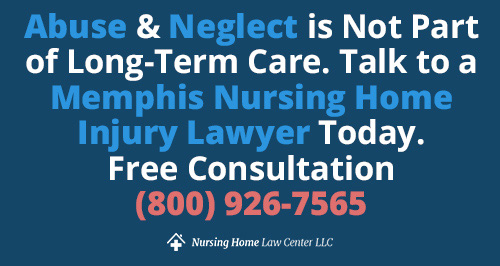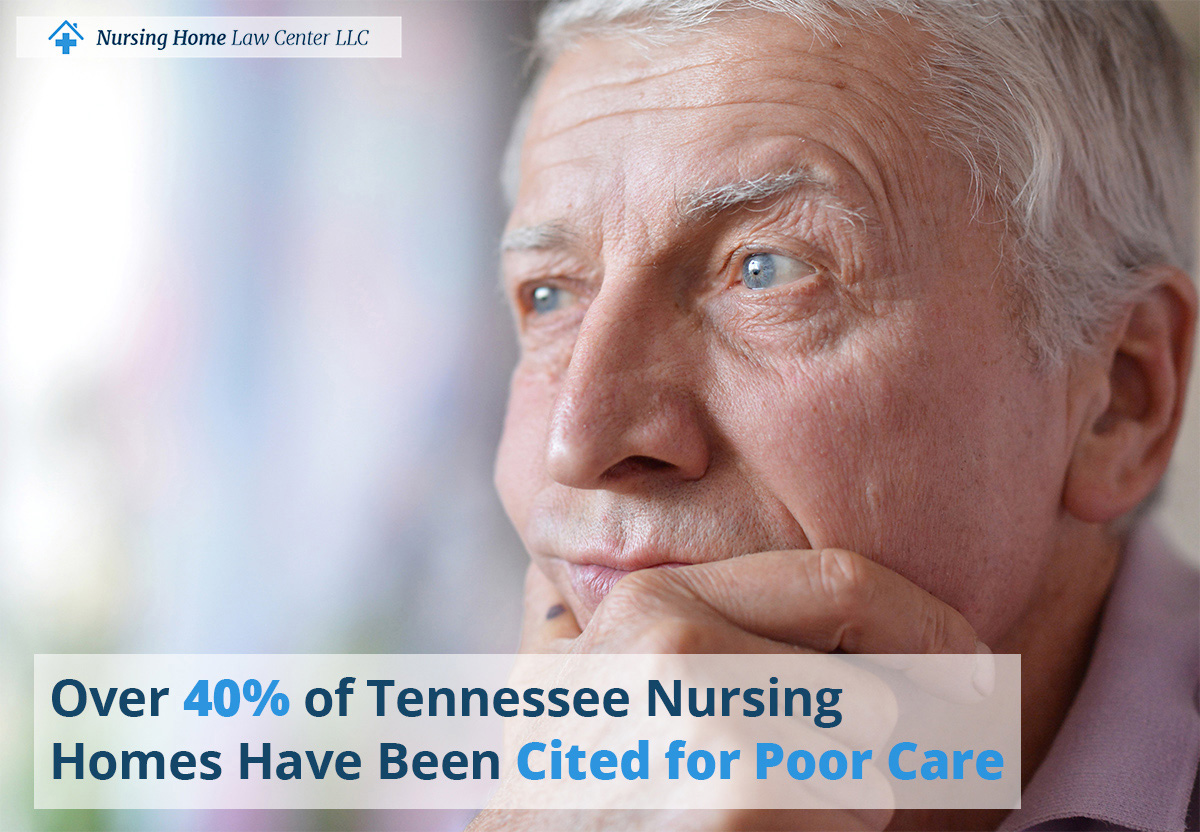legal resources necessary to hold negligent facilities accountable.
Memphis Nursing Home Abuse Lawyer
Addressing nursing home abuse requires a thorough understanding of its various forms and the complex dynamics at play in care facilities. Whether it's physical abuse, emotional manipulation, or financial exploitation, the consequences for elderly victims are profound.
Each Memphis nursing home abuse lawyer at Nursing Home Law Center, LLC stands at the forefront of this fight, providing robust legal support to those affected. Our approach involves meticulous investigation and strong advocacy, ensuring victims' rights are upheld, and their voices are heard.
 Advocating for Victims of Nursing Home Neglect and Abuse in Memphis
Advocating for Victims of Nursing Home Neglect and Abuse in MemphisThe issue of mistreatment in Memphis nursing facilities is a significant concern, requiring the expertise and dedication of a skilled Memphis nursing home abuse lawyer. Our law firm specializes in advocating for the rights and protection of elderly patients in nursing and assisted living facilities, understanding the complexities and sensitivities involved in such cases. Our commitment is to legal excellence and our clients' and their families' compassionate and respectful treatment.
Nursing Home Statistics and Abuse Cases in Memphis, TennesseeIn December 2023, the Centers for Medicare and Medicaid Services (CMS) released a concerning report on nursing home facilities in Memphis, Tennessee. Shockingly, 27 out of the 51 facilities, which accounts for a staggering 53%, were rated as "below average" or "much below average." This data highlights a pressing regional issue, raising significant concerns for family members and patients.
Facilities With Cited Abuse CasesAmong the facilities that garnered these low ratings, several have also faced scrutiny for abuse cases, including sexual abuse, psychological abuse, and neglect. Family members and patients must be aware of these incidents to protect their loved ones. Some of the facilities with cited abuse cases include:
- Gallaway Health and Rehab
- Graceland Rehabilitation and Nursing Care Center
- Midtown Center for Health and Rehabilitation
- Millington Healthcare Center
- Quince Nursing and Rehab Center
- Ripley Healthcare and Rehab Center
These incidents highlight the importance of staying vigilant when choosing a nursing home or rehabilitation center for a loved one. Nursing abuse cases can have devastating consequences for the elderly patients involved. Recognizing the warning signs and promptly acting if abuse or neglect is suspected is essential.
 Types of Neglect and Abuse in Memphis Nursing Homes
Types of Neglect and Abuse in Memphis Nursing HomesUnderstanding the various types of abuse that can occur within nursing facilities is crucial in protecting residents. Our law firm has extensive experience in dealing with various abuse cases, ensuring that all elderly patients receive the respect and care they deserve.
- Physical Abuse: This includes any form of physical harm, such as hitting, pushing, or causing broken bones.
- Sexual Abuse: Involves any non-consensual sexual activity or exploitation, including unwanted advances, molestation, or rape.
- Emotional Abuse: Emotional or psychological abuse can be just as damaging, manifesting as verbal threats, isolation, or humiliation.
- Financial Exploitation: Unauthorized control over an elderly individual's finances or property.
- Neglect: Failing to provide necessary care, leading to poor hygiene, malnutrition, or untreated medical conditions.
 Recognizing the Warning Signs of Mistreatment in Nursing Homes
Recognizing the Warning Signs of Mistreatment in Nursing HomesRecognizing the signs of abuse is crucial in taking timely action to protect nursing patients. Our team guides on identifying these signs and understanding what they may indicate about the care being provided.
Identifying physical and behavioral indicators include:
- Physical Signs: Unexplained injuries, frequent falls, or signs of restraint.
- Behavioral Signs: Sudden changes in behavior, withdrawal, or signs of fear or anxiety.
The underreporting of abuse within nursing homes is a significant barrier to justice and can perpetuate the cycle of neglect and mistreatment.
Our Tennessee nursing home abuse lawyers emphasize the importance of vigilance and the need for families to be proactive in monitoring the care of their beloved family members.
 How Our Law Firm Can Help
How Our Law Firm Can HelpAt our elder abuse law firm, we are committed to providing the highest level of legal support to abused victims. Our approach is tailored to the needs of each client, ensuring that they receive personalized and effective representation.
Our Memphis personal injury lawyers have a proven track record in handling elder abuse cases. We bring a wealth of experience and knowledge to each case, ensuring the best possible outcomes for our clients.
We offer various legal services to support our clients, from initial consultation to litigation. Our comprehensive approach addresses all aspects of a case to ensure that every client receives the support they need.
Steps to Take if You Suspect AbuseIf you suspect abuse or neglect, there are immediate steps you can take to protect your beloved family member. Our law firm guides these steps, ensuring victims and their families have the support they need. We advise on how to report and document suspected elder abuse effectively.
Understanding the procedures to report caregiver abuse in Tennessee is crucial to ensure swift and appropriate action. You can report incidents to several relevant agencies and authorities, including:
- Local authorities: To report instances of abuse or neglect within nursing care homes, contact your local law enforcement agency or police department. They are equipped to initiate investigations when such cases arise.
- Tennessee Department of Health: The state health department oversees and regulates healthcare facilities, including nursing homes. Should you witness or have concerns about abuse or the quality of care, you can report it to the Tennessee Department of Health.
- Tennessee Long-Term Care Ombudsman Program: Dedicated to advocating for the rights and well-being of residents in long-term care facilities, including nursing homes, the Ombudsman program is a valuable resource for addressing complaints and ensuring proper investigations are conducted.
- Tennessee Department of Human Services: In cases involving vulnerable adults, the Department of Human Services can offer essential support and resources to address abuse or neglect situations, assisting in protecting those in need.
Reporting abuse promptly is critical, as it not only safeguards the resident's well-being but also helps prevent further instances of abuse. Our law firm specializes in assisting families in navigating the reporting process effectively. We guide you through the appropriate channels to ensure that your reports have the maximum impact.
Our ultimate goal is for each nursing home abuse attorney to address individual cases and contribute to creating a safer environment for all nursing home residents.
Consulting with an experienced attorney is crucial in exploring legal avenues and protecting the victim's rights. Our firm offers expert advice and support to families during this challenging time.
Legal Protections for the Elderly in Nursing HomesElderly nursing home and assisted living facility residents have rights and protections under federal and Tennessee state laws. Our Memphis personal injury lawyer team has in-depth knowledge of these legal protections and uses them to defend the interests of our clients.
The rights of elderly patients include the right to a safe environment free from elder abuse and neglect, the right to receive adequate medical care, and the right to be treated with respect and dignity. Our firm holds negligent healthcare providers and nursing facilities accountable for their actions and ensures justice is served.
Understanding these rights is critical for patients and their families. As part of our legal services, we guide families through the legal process, ensuring they understand their legal options and the actions they can take if they suspect abuse.
The Role of Legal AdvocacyThe role of legal advocacy in protecting the rights of nursing home residents cannot be overstated. Our nursing home neglect lawyers are well-versed in the complexities of personal injury and medical malpractice law and understand the unique aspects of personal injury cases. We use our expertise to navigate the legal system effectively and ensure our clients' voices are heard.
Legal advocacy involves more than just courtroom representation; it includes providing emotional support to clients during a daunting task and often challenging time.
Through legal advocacy, we aim to address individual cases and drive systemic change within the industry. By highlighting patterns of abuse and holding caregiving facilities and staff members accountable, we strive to improve conditions for many residents across Memphis and beyond.
Recoverable Damages in Nursing Home Abuse CasesAbused victims and their families may be entitled to recover damages for harm. Our attorneys are skilled in identifying the full extent of compensable damages and will work tirelessly to ensure that victims receive the proper compensation they need and deserve.
Types of CompensationIn caregiving abuse cases, victims may be eligible for various types of compensation, including reimbursement for medical expenses incurred due to the abuse, compensation for pain and suffering, and punitive damages to punish the facility or staff member for particularly egregious conduct.
How Our Law Firm Can HelpWhen faced with the complexities of a caregiving abuse case, choosing the right legal representation is crucial. Our law firm, with its team of dedicated attorneys, offers the experience and commitment needed to navigate these difficult waters.
Experienced Representation in Cases in Nursing HomesOur firm prides itself on providing experienced representation for abused victims in Memphis. Our attorneys deeply understand the unique challenges these cases present, from uncovering evidence of abuse and neglect to challenging negligent hiring practices that put residents at risk.
We have successfully represented clients in a range of personal injury cases, including those involving traumatic brain injury and medical malpractice within professional caregiving settings.
Navigating Nursing Home Wrongful Death ClaimsThe tragedy of wrongful death in nursing homes is a harrowing reality, underscoring the need for accountability and justice. When a loved one's life is lost due to abuse, neglect, or medical malpractice within a nursing home, it leaves families devastated. Wrongful death in these circumstances demands immediate action to seek justice for the victim and provide support to the grieving family.
A skilled nursing home abuse lawyer can be pivotal in securing financial compensation to cover various costs, including medical expenses incurred before the victim's passing. These legal professionals advocate tirelessly for the family, ensuring they receive the support they need during this difficult time. In addition to addressing the wrongful death, compensation can assist with medical bills, funeral expenses, and other financial burdens.
By holding those responsible accountable for their actions or negligence, our lawyers help families find closure and contribute to a safer environment for all nursing home patients.
Contact Our Memphis Nursing Home Abuse Lawyers TodayIf you or a family member has experienced abuse or neglect in a caregiving home, we encourage you to reach out to our firm. Our compassionate Memphis nursing home abuse attorneys are ready to provide the support and legal expertise you need during this difficult time.
Our firm offers a free consultation to help you understand your options and the next steps in the legal process. Contact our nursing facility abuse lawyers at (800) 926-7565 to speak with an experienced attorney. All confidential or sensitive information you share remains private through an attorney-client relationship.
 Shelby County Nursing Home Injury Lawyer Nursing Home Law Center LLC Home
Shelby County Nursing Home Injury Lawyer Nursing Home Law Center LLC Home
